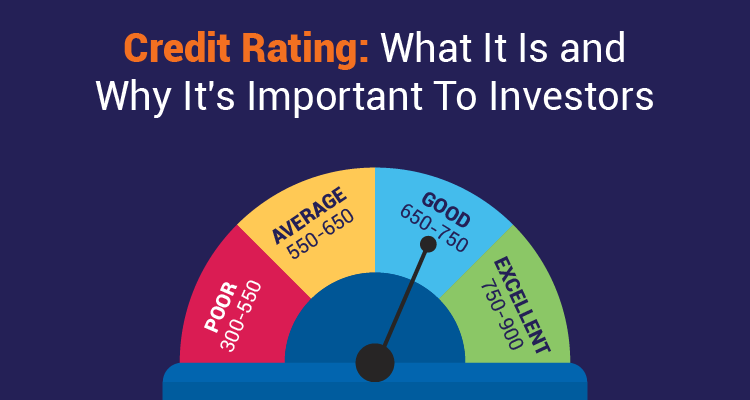Credit Rating: What It Is and Why It's Important To Investors

A credit rating is a tool used to determine the creditworthiness of an entity, including individuals, groups, corporations, non-profit organisations, governments, and even entire nations. In order to determine whether or not these borrowers would be able to repay loans on time, specialised credit rating companies analyse their financial risk.
Credit rating agencies conduct detailed research and analysis to determine the rating. They consider a number of variables including past lending and borrowing history, ability to repay the debt, prior debts, potential for future economic growth, and more.
A high credit rating increases credibility and shows a solid track record of timely loan repayment in the past. It helps banks and investors to determine whether to invest in a debt instrument, approve loan applications and decide the rate of interest at which the loan should be extended.
It must be noted that while the terms of credit score and credit rating are sometimes used interchangeably, they are actually two different concepts.
A credit rating is used to evaluate a corporation or company's creditworthiness rather than an individual's. The rating is generated using corporate financial instruments and is often presented as a list of alphabetical symbols.
Meanwhile, a credit score is a number that is assigned to people to gauge their creditworthiness. It typically ranges from 300 to 900. It is computed by credit bureaus using the individual's credit information report and affects whether or not they are granted loans and credit cards.
Credit reporting agencies like Experian, Equifax, and TransUnion use to determine each individual's credit score on a three-digit numeric scale. Credit ratings organisations like S&P Global, Moody's, or Fitch Ratings and local agencies like Credit Rating Information Services of India (CRISIL), Investment Information and Credit Rating Agency of India (ICRA), Credit Analysis and Research (CARE), India Rating and Research determine credit ratings for businesses and governments. Such rating agencies are employed and paid by the party seeking a credit rating for itself or one of its debt issues.
A potential investor's choice of whether or not to purchase bonds is also heavily influenced by credit ratings. A risky investment invokes a poor credit rating. That's because it shows a higher likelihood that the organisation will not be able to pay its bond obligations.
As credit scores are dynamic and not fixed, borrowers need to constantly work on keeping them at a high level. They fluctuate frequently based on the most recent data and even one negative debt can lower even the best rating.
Importance Of Credit Rating For Investors
A credit rating shows the ability and willingness of a borrower to repay a loan without defaulting. Through a credit rating, investors can learn about the issuing company's financial stability and the instrument's credit quality.
Also, the rating symbol denotes the degree of risk associated with it. A highly rated company's instrument guarantees investors' investment security and bankruptcy protection.
The credit rating's rating symbols are clearly identifiable and can be understood at a glance. By understanding the rating they received, investors can gauge the risks associated with their assets.
Despite being backed by strong finances, credit instruments are difficult for investors to evaluate. Therefore, for the advantage of investors, the credit rating agency gathers, examines, and interprets the complex information in a simple manner.
When an organisation hires a credit rating agency it indicates that it is confident of its operations and the management is open to independent scrutiny. As the rating agency is independent of the issuer company and has no vested interest, therefore rated securities increase the dependability of the rated instruments for investors.
In these times, investors have a variety of credit instruments they can choose to invest in depending on their risk tolerance and diversification strategy. Credit rating offers investors an objective and unbiased view to help them choose the most suitable investments.
Conclusion
Lenders like IIFL Finance lay a lot of emphasis on the credit histories of their borrowers. While applications of people with lower credit scores may be considered and approved, an ideal credit score is 750 or above.
A good lender can also offer the most competitive interest rates to their clients as long as they have a clean credit history and have had no past record of late repayments or defaults on their loans.
Top NBFCs like IIFL Finance provide easy loan approvals with a hassle-free process. IIFL Finance also offers competitive interest rates and flexible repayment terms that make it easier for the borrowers to clear their debt burden with ease.
Disclaimer: The information contained in this post is for general information purposes only. IIFL Finance Limited (including its associates and affiliates) ("the Company") assumes no liability or responsibility for any errors or omissions in the contents of this post and under no circumstances shall the Company be liable for any damage, loss, injury or disappointment etc. suffered by any reader. All information in this post is provided "as is", with no guarantee of completeness, accuracy, timeliness or of the results etc. obtained from the use of this information, and without warranty of any kind, express or implied, including, but not limited to warranties of performance, merchantability and fitness for a particular purpose. Given the changing nature of laws, rules and regulations, there may be delays, omissions or inaccuracies in the information contained in this post. The information on this post is provided with the understanding that the Company is not herein engaged in rendering legal, accounting, tax, or other professional advice and services. As such, it should not be used as a substitute for consultation with professional accounting, tax, legal or other competent advisers. This post may contain views and opinions which are those of the authors and do not necessarily reflect the official policy or position of any other agency or organization. This post may also contain links to external websites that are not provided or maintained by or in any way affiliated with the Company and the Company does not guarantee the accuracy, relevance, timeliness, or completeness of any information on these external websites. Any/ all (Gold/ Personal/ Business) loan product specifications and information that maybe stated in this post are subject to change from time to time, readers are advised to reach out to the Company for current specifications of the said (Gold/ Personal/ Business) loan.



